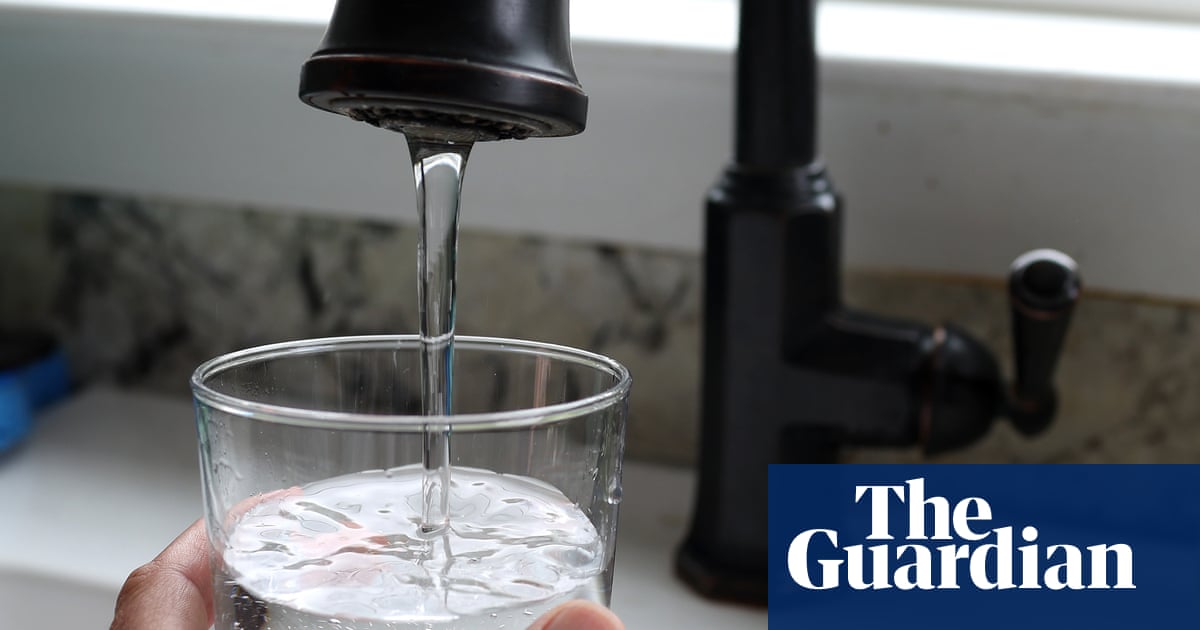Most of these comments are people recommending bottled water or various filtration methods, both of which could work in varying degrees. Let’s not miss the point that people who will be most impacted are low income and might struggle to pay their tap water bill. Bottled water and filters are a stretch for those folks. The true fix is demanding more of our politicians to hold polluters accountable and push for better treatment of the tap water.
Aren’t people paying taxes?
No idea why people would rather spend more money than to hold the government accountable to fix the services they pay for.
Conservative “government is the problem” brain rot is extremely pervasive.
I live in the Cape Fear area of North Carolina and we are dealing with this. Chemors, the maker of Teflon, has been dumping PFAS in our water.
My town recently built a reverse osmosis water treatment plant. It is the only way to get it out of the water. Traditional water filters don’t work.
Did they at least get Chemors to stop dumping the shit too??
3 companies were found liable for having knowingly dumped toxic PFAS into our drinking water supply. Chemours, Dupont, and Corteva. They admitted no wrong doing, but settled out of court for a total of 1.19 billion, half of which was paid by Chemours, the main contributor, and the other half paid by Dupont and Corteva. This happened in June 2023.
Annual Profits
Dupont: ~14 billion per year
Chemours: ~7 billion per year
Corteva: ~17 billion per year
PFAS in drinking water has been found to cause numerous health problems, including “altered metabolism, fertility, reduced fetal growth and increased risk of being overweight or obese, increased risk of some cancers, and reduced ability of the immune system to fight infections.”
Bottled water is the fucking problem. Don’t whinge about anything climate based if you recommend plastic. The disconnect on solving contaminated water with plastic water bottles s mind boggling.
If you don’t have a water source very close plastic beats glass very fast.
Glass is so much heavier that the additional fuel to transport it over 100km offsets whatever emissions plastic creates.
This is the classic “no good option” dilemma depending where you live.
In many parts of Europe you can buy the locally sourced water from glass bottles - but it doesn’t make much sense buying glass bottles for climate change reasons otherwise
I don’t know much about this but wouldn’t a water filter be better?
We have great municipal water so I have never used one, but it at least sounds better than buying bottled water.
Yeah using the local tap water and adding a water filter if necessary is the best option for sure
What are you even talking about? The moral “dilemma” here isn’t between water bottled in plastic vs. water bottled in glass; it’s between water bottled in plastic and water piped through the damn tap. Tap water is unambiguously superior and it’s not even close.
If that’s drinkable then definitely
Not sure if I’d trust a 20€ Amazon filter with US tap water in some regions
As long as the companies providing the water a) make more than enough profits and b) are not held accountable, why should they do anything about it?
Because it’s morally right? But I get your point and understand the question isn’t meant to be answered.
“Morally right” does neither rise the shareholders profits nor the managers bonus.
this guy capitalists
Know your enemy!
Municipal water supply is one of the few things left that’s almost universally provided by the government directly instead of being outsourced to corporations. “Morally right” should actually matter here!
Everyone for years - “Why do you waste money on bottled water” (the big 5 gallon kind on a dispenser)
Me - Uh, have you ever had tap water?Isn’t most bottled water just tap water packaged in landfill fodder?
Yep most people have no clue that your bottle water is tap water filter but as all the same chemicals in them.
If they didn’t the water turn green or brown in a month.
Grew up on well water you can’t keep it for months on end and if you don’t use the line for awhile there is a smell.
Sparkletts has a filter option which iirc they call primo and a spring water option. I get the spring water, so unless they are flat out lying, no it’s not in my case.
Yeah, no, you’re just paying to drink tap water and making a shitty company like Nestle rich in the process in addition to creating more waste.
Do yourself a favor and get a nice stainless steel or glass waterbottle along with a good filter or better yet, purifier. They won’t get rid of everything but they reduce a lot of stuff you don’t want to drink (like lead) and taste better than tap water.
I’m a fan of under sink filters. Dead simple to install and replace the filter. I never trusted those dispensers because many of them are just local tap water.
I doubt your house filter removes PFAS either.
Why? PFAS is pretty large, and is readily removed by activated carbon, particularly GAC (Granular Activated Carbon), Ion Exchange Resin, and Reverse Osmosis. Multistage RO filters are “Dead simple to install and replace”. Do you have any reason, or is doubting just a way of life for you? FWIW, I have RO filtration for my drinking and cooking water. You might want to consider it.
Reducing PFAS in Drinking Water with Treatment Technologies
https://www.epa.gov/sciencematters/reducing-pfas-drinking-water-treatment-technologiesCited in the article:
Data Summary of The Fifth Unregulated Contaminant Monitoring Rule
https://www.epa.gov/dwucmr/data-summary-fifth-unregulated-contaminant-monitoring-ruledeleted by creator
Got a big water pitcher/filter I keep in the fridge. Fill it maybe once a day. Now my water is filtered and cold. under sink is probably better quality filter, though.
Depends on the filters I’d think. A good pitcher filter can work great and there are probably under sink filters that aren’t that great. Doesn’t necessarily mean they’re better or worse. That said, there are some pretty nice under sink filtration systems.
It’s spring water from sparkletts. I made sure not to get just filtered tap water. Unless they are flat out lying about what is in the bottles (not saying it’s even a far stretch, but I can’t do any more due diligence)
That water isn’t much better. But that’s why I fill my 5 gallon jugs with the distilled water (self distilled tap water).
Make sure you remineralize your distilled water or it will degrade your teeth over time.
Can you elaborate on this point? I installed a to system in my house this year, so I’m curious about that but.
Not OP, but basically tap water, depending on where it comes from, may have more or less calcium in it. If you’re used to drinking high calcium water, you might not be drinking lots of milk or eating much cheese. Shifting to purified water would remove said calcium from the diet and leave you at a slight deficit. Incorporate some other source of minerals into your diet.
Same goes for other things you would get from water like sodium (though not a concern if your diet is high enough in sodium), magnesium even if you are blessed with a source of mineral water.
The human body uses these ions in way more ways than just say… calcium for bones. Calcium is important for example for proper muscle function (including the heart muscle), as are magnesium, sodium and potassium - that’s why you feel like crap when hungover - drinking too much caused you to eliminate too much water. And the kidneys cannot eliminate just pure water, they do so by using some of the aforementioned ions, and since alcohol forces elimination of water from the body, the kidneys start throwing out whatever they can to get the water out too, starting with sodium and potassium. That’s why salty snacks taste so good with alcohol and bananas are recommended for hangovers.
But I digress.
TL;DR - Keep your ions in balance, folks - RO or distilled water no longer contain sodium, calcium, potassium and other such goodies. Get them somewhere else.
Thanks for the informative reply!
I tend to drink mostly to water currently, but I make a point to take a daily multivitamin, so hopefully that will help make up for the lack of minerals in my water.
Plenty of other sources for said minerals ;)
Better be distilling multiple times to get rid of PFAS.
It’s literally the most effective way to get rid of PFAS. I’m ok with over 99.x% PFAS free for water after just one cycle
Exactly. One thing I’ve learned from areas with unsafe drinking water is the beauty of stores dedicated to providing purified water (delivery an added bonus). Going back to the US and drinking “safe” tap water has always been pretty gross after that, even in houses with some filtration systems.
A home-based RO system would be nice, but I’ve always wondered if the ones people usually get (<$500) can compete with the quality of the commercial suppliers/stores that you typically see in other countries. Likewise for the small fill stations common on the outside of US grocery stores. Are all these systems truly of similar quality? I have a hard time trusting those tiny little under-sink setups and the unattended outdoor water fills.
After having one of those undersink systems, I can say they work, the water is very pure coming out, only issue being that it’s basically pure water - no minerals, no anything -
some issues there with actual hydration since drinking pure water can kill you - look up hyponatremia.edit: might not be the case - see reply
The principle is the same as for the more expensive systems, what you don’t get is
- potentially an UV inline lamp to sanitize stuff
- a pump to increase the pressure and increase efficiency/speed
- maybe a storage tank (some cheaper models have like a 1-2 gallon storage tank)
- not sure about this one but more expensive membranes might have a better removal rating - mine said 95% I think
If you have around 45 psi of water pressure on your tap, it’s good enough, but don’t expect to be bathing in the stuff, it takes quite a long time to get usable quantities and I think you get 1L RO water to 4-5 L ‘waste’ water. Higher pressure - higher efficiency and speed but check the pressures the membrane is rated for. Also if your water is chlorinated you need some activated charcoal pre-filters because chlorine harms the membrane.
Maintenance should also be done regularly to change prefilters once every 3 months and the membrane once every 9-12 months. And it can get slightly messy on cheaper models.
some issues there with actual hydration since drinking pure water can kill you
This is a myth. You cannot be harmed from pure water, even distilled water. Lab-pure molecular water tastes like shit, anyways.
https://medicalsciences.stackexchange.com/questions/20837/can-drinking-ultra-pure-water-be-dangerous
ACUTE effects of drinking distilled water
The idea behind the myth that distilled water is harmful is that its low osmolality (“tonicity”) could dangerously decrease the blood osmolality, which is normally: 285-295 mmol/kg. But distilled water has only slightly lower osmolality (0 mmol/kg) than tap water (~3 mmol/kg) (SGSM.ch, Table 2), so if drinking appropriate amounts of tap water does not significantly lower blood osmolality, distilled water also shouldn’t.The difference between tap and 100% pure water is so slight that it’ll never cause hyponatremia. What WILL cause hyponatremia is drinking way, WAY too much water in a short span of time. That’ll dilute your blood (hyponatremia) from ions that you need as your kidneys desperately try to get rid of all the water. This is entirely mitigated by eating foods around the same time that are not entirely deficient in minerals like salt (pretty much all foods).
I’m imagine it depends who the service company for the filling machine is. Our delivery is from sparkeletts, and I made sure to get the spring water, not the filtered water.
I agree. ”It depends” seems like the right answer to me.
Having access to clean, tested spring water seems ideal. You’re a lucky one!
But for areas dealing with contaminated water (whether it’s PFAS, lead pipes like Flint Michigan, or literal shit and commercial chemical dumping from areas with lackluster water treatment, mostly outside the US) then “it depends” seems the right answer.
What’s the RO membrane rating? Does the system have UV? Charcoal? Remineralization? And do they perform the necessary maintenance? Seems like these are the critical factors about the system and might be found in someone’s home, might be at the stores, but it depends!
I lived the majority of ky adult life with a roommate who kept a 100 gallon salt water coral aquarium for almost a decade. One of the most expensive, difficult, time demanding hobbies I’ve ever seen. He couldn’t afford to replace the 20 or so gallon that needed to be replaced every couple weeks to keep the salinity and other chemical levels stable, so we had one of those under the sink RO filters. It always tasted great unless he forgot to change the filters. I worked at a Starbucks for quite a while and they basically just have a larger version of that which is changed out whenever the sensors ping their maintenance hq. Water there tasted the same.
Plastic bottled water to me is one of the ultimate fuck yous to the planet’s ecosystem that most people could easily stop today. It’s telling that the consumable plastic market is primarily owned by the oil companies, hell it’s one of the many products that can be developed from the refinery process. Short answer is get a metal thermos or canteen and refill it with RO or some other filtered water, get one of those Brita pitchers if you can’t or won’t install an RO, and cut back on your plastic containers as much as you feasibly can.
My thoughts are more centered on true purity and safety, but it’s usually a good sign if it at least tastes better! As we learn more about water contamination, it seems like a well-designed and well-maintained RO system is a good idea for people who want to help protect their health.
Single-use plastic water bottles are basically a crime against humanity, especially when used frivolously (drinking bottles filled with tap water of the same quality that comes out of the faucet). But the reusable 5-gallon jugs are a different category, in my opinion. In many places, these large plastic containers are by far the most popular lifeline to safe drinking water. Of course I’d prefer metal or glass, but the logistical challenges and availability make them a problem.
What material are those bottles made out of by the way?










